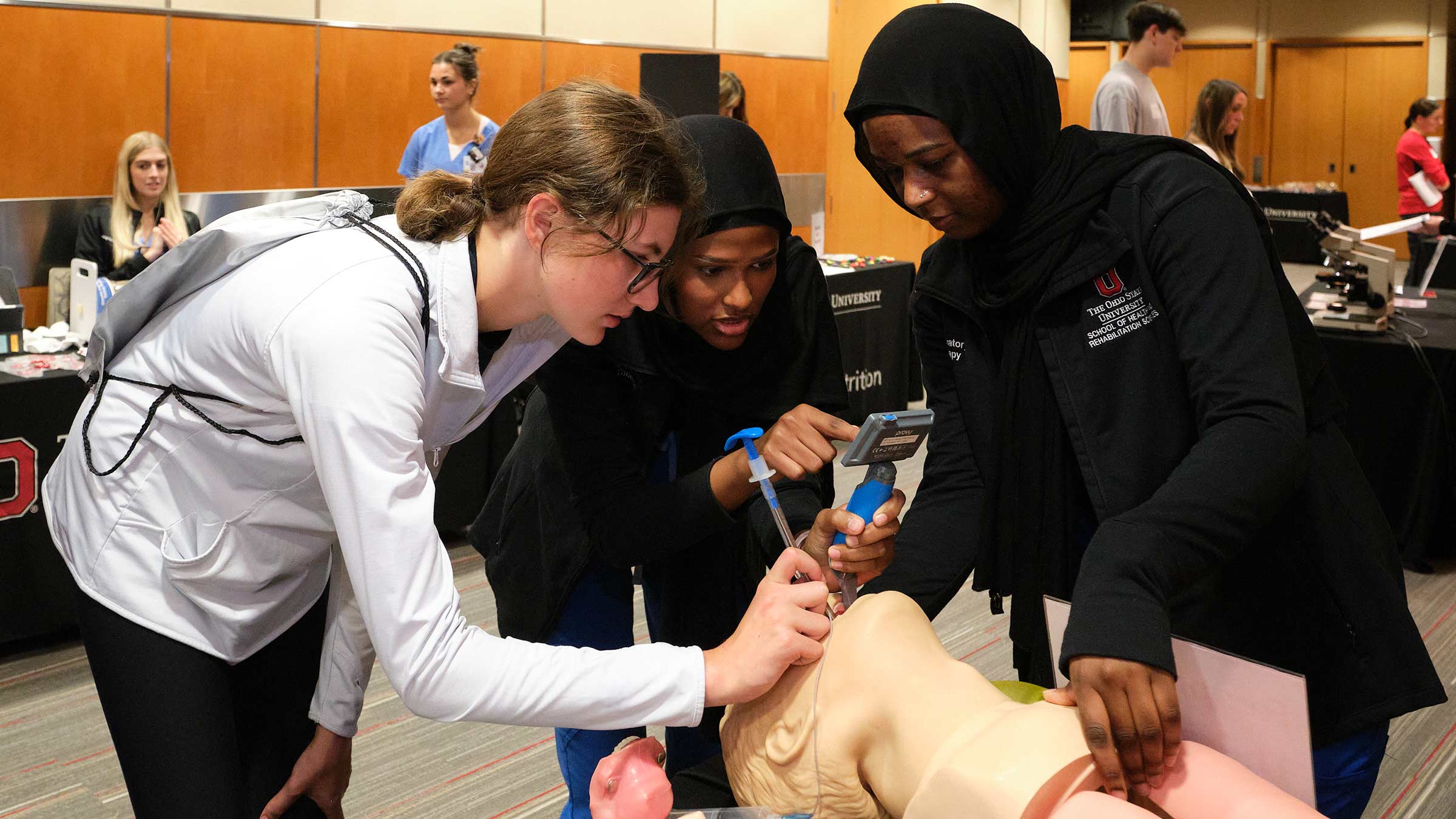Building mental health resilience by retraining the brain
Jacqueline Hoying, PhD, RN, trains college students and medical staffs in an evidence-based program to reduce mental health issues.
Calm doesn’t come naturally to Jacqueline "Jackie" Hoying, PhD, RN, the director of a program that teaches people tactics for reducing their anxiety and depression.
Or at least calm didn’t always come naturally to Dr. Hoying.
She’s driven and thoughtful, but low-key? She’s had to work at that. So, it makes sense why Hoying was drawn to MINDSTRONG, a program she teaches to two groups under especially high degrees of stress: college students and health care professionals.
Working with universities and hospitals in 22 states, Dr. Hoying trains people to swap their negative thoughts for positive ones, deal with difficult emotions and quiet brains ever-focused on to-do lists. The program is based on cognitive behavioral therapy’s main belief: Change your thoughts from negative to positive and you can change not only how you think about yourself and your life experiences but also how you feel and how you behave.
About a decade ago, Dr. Hoying, an assistant clinical professor of nursing at The Ohio State University College of Nursing, was introduced to MINDSTRONG.
At the time, she was pursuing a doctoral degree at Ohio State and was a self-described “adrenalin junkie.” She had worked in critical care, then managed nursing teams, ultimately rising to the level of a hospital chief nursing officer. In all her 25 years of nursing, the jobs required her to constantly respond to a crisis and quickly problem-solve.
“And I thought I was thriving under all that pressure,” she says.
All the while, she was helping raise four daughters who used to joke with her: “Good thing you have a full-time job.”
If she hadn’t, they figured she’d be sweating the small stuff of their lives. Homework assignments and school supplies, summer camps and extracurriculars. It was a harried life and Dr. Hoying’s mind was always zeroed in on what had to be done next.
That was before she started practicing the techniques in MINDSTRONG. The seven-session program challenges participants to create and repeat daily positive affirmations, identify and change unhealthy thoughts and habits, and learn meditation and breathing techniques to usher more peacefulness into their frenzied lives.
The “after MINDSTRONG” Dr. Hoying is no longer a perfectionist, no longer multitasking, no longer fretting. If she does worry on occasion, it’s not for long. It certainly doesn’t cost her sleep.
“It’s practice over time,” Dr. Hoying says of the skills she promotes. “None of us walks out and says, ‘I’ve got all of it. Good to go.’”
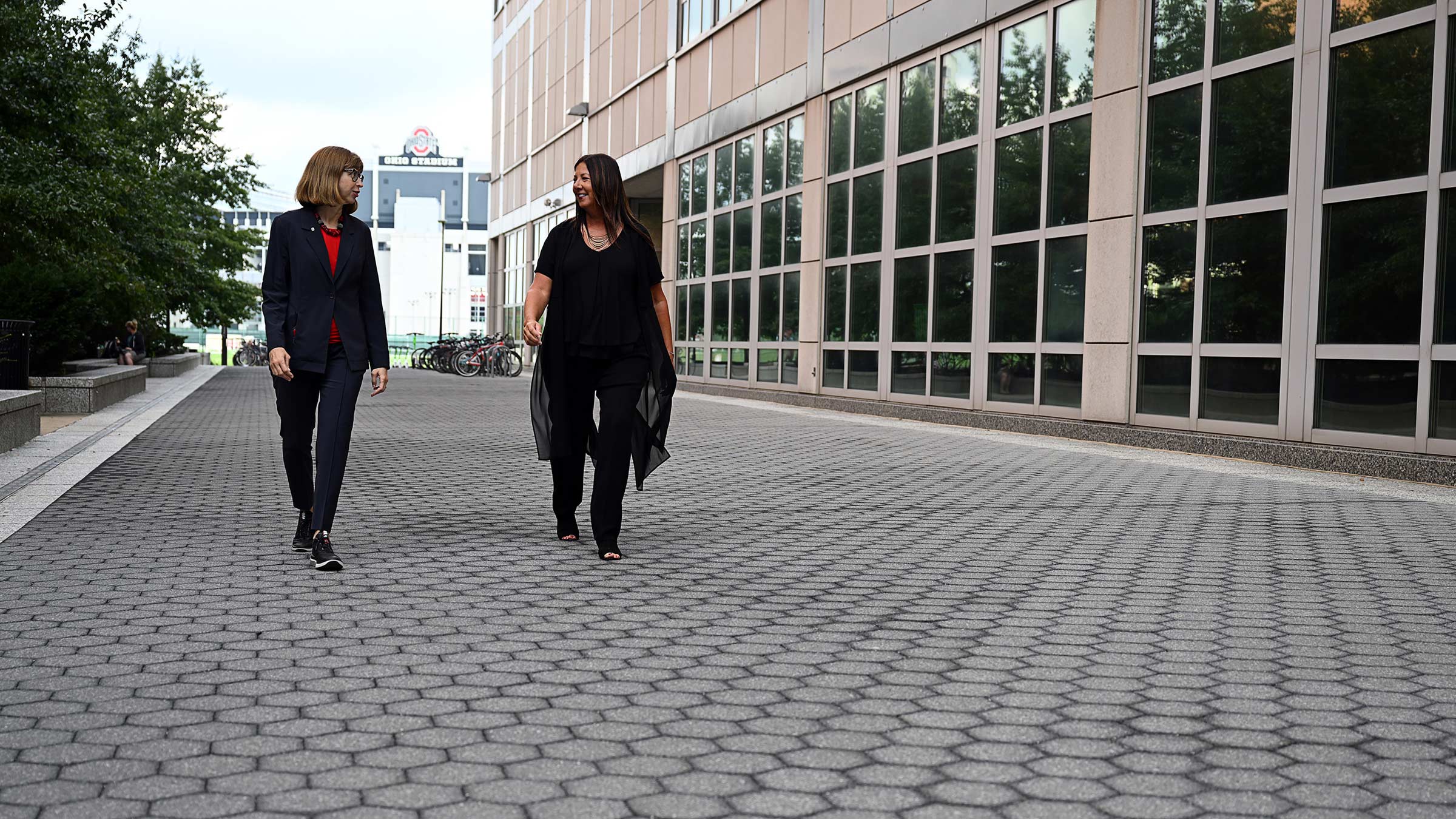
From novice to expert and back again
Dr. Hoying has always thrived at jumping in and trying something new, then as she puts it, “moving from novice to expert” before returning to novice again to learn something else.
In her home growing up, she remembers her father often holding up his pinky and saying. “You’re not done learning until your pinky finger grows to be as long as your ring finger.”
The notion stuck.
“Sometimes it’s terrifying,” she says of learning something new. “It’s not like I’m full of confidence all the time.”
She smiles and shakes her head. “No, I’m sure not.”
And yet, fear of change has never kept Dr. Hoying from diving in. After 25 years supervising hospital nursing staffs, she made the unusual decision, at 50, to return to college for a doctoral degree in nursing. She began training for and running marathons when she was 40.
Her adventurous nature and interest in continually learning stems in part from her upbringing. The eldest of five children, she sat in the driver’s seat of a tractor as an 11-year-old, plowing fields on her family’s dairy farm where everyone pitched in, learning on the fly.
Mental health resilience for all
The MINDSTRONG program that Dr. Hoying directs was created and extensively tested by Bernadette Mazurek Melnyk, PhD, APRN-CNP, FAAN, vice president for health promotion and university chief wellness officer at The Ohio State University, where she also serves as dean for the College of Nursing. Dr. Melnyk came up with the approach through two decades of research on mental health and resilience. Studies done by her and Dr. Hoying have shown statistically significant decreases in depression, anxiety and suicidal thoughts among participants in the program.
Dr. Hoying’s pipe dream is for everyone to have an opportunity to take the MINDSTRONG course and change how they see themselves and deal with life’s ups and downs.
Even before the pandemic, an ever-growing number of young people struggled with some type of mental health issue. Among adults in the United States, the prevalence of any mental health illness is highest for 18- to 25-year-olds according to the National Institutes of Health.
College can be a fraught period. Being away from parents for the first time. Adjusting to the pressure of difficult classes. Choosing a major and a career path. Meeting and making friends. The financial stress of loans and juggling jobs and school to help pay for it all.
Open to all students at Ohio State, MINDSTRONG is a one-unit pass/fail course required for all pre-nursing students in Ohio State’s College of Nursing. It’s also a requirement for incoming graduate students in the College of Veterinarian Medicine pursuing a doctorate degree in a profession with a much higher rate of suicide than in the general public.
“I think we’re all focused on our physical health and that’s extremely important. Working on your mental health is really important too,” Dr. Hoying says. “Even if you weren’t born with a sense of optimism, I know you can improve your resilience. That, to me, is amazing. And it’s something I want to have happen.”
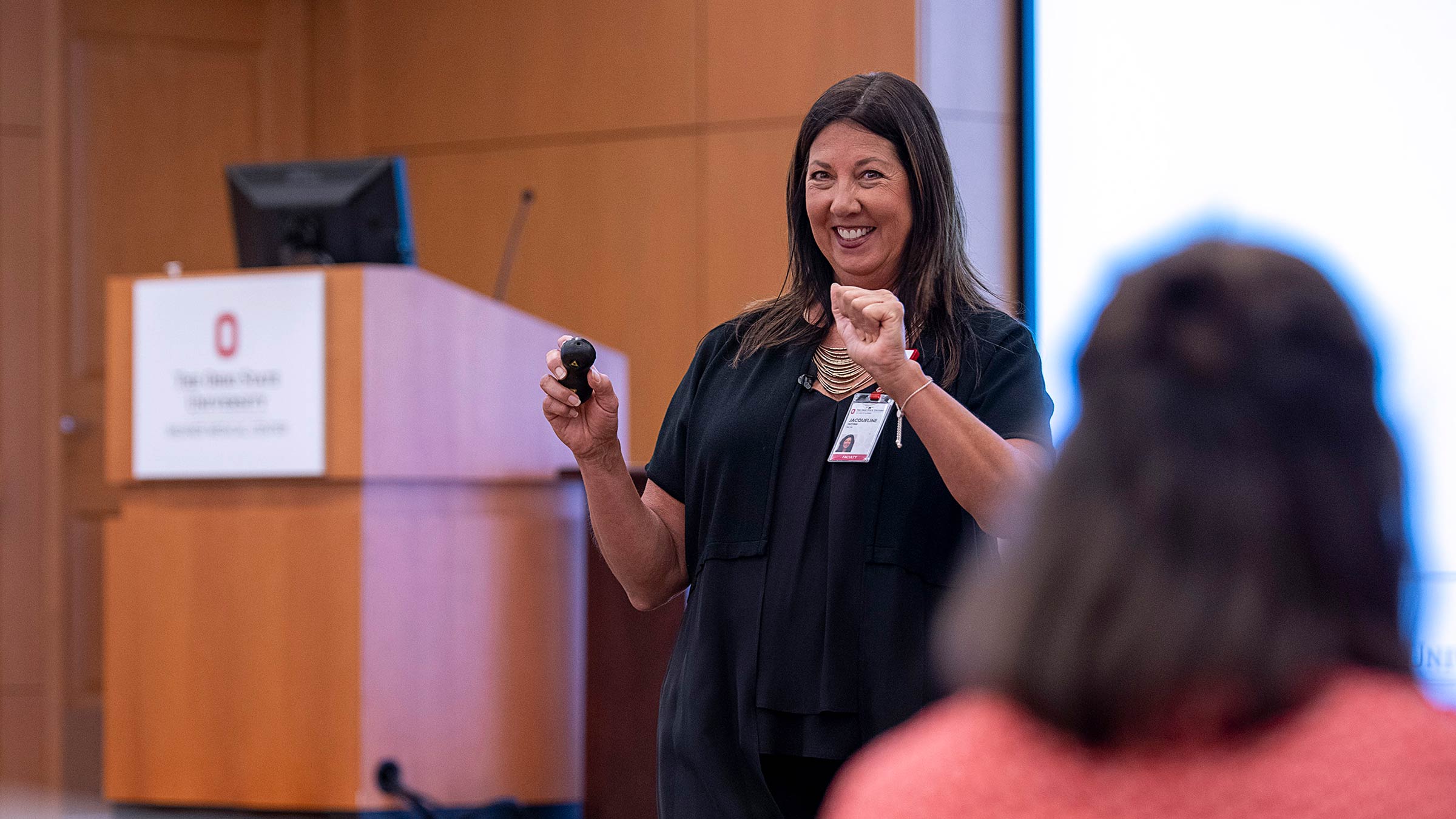
A buffer against burnout
It’s a Tuesday morning and Dr. Hoying’s voice sounds a bit raspy. She’s getting over COVID-19 so she opens an online training workshop for MINDSTRONG facilitators with an apology: At some point, she may have to mute if she starts coughing.
In her Zoom audience are two nurse administrators who have been around COVID-19 enough to understand the symptoms can last. One administrator is from Virginia, another from Florida. They’ve come to learn the techniques of MINDSTRONG so they can pass them along to their staff challenged like so many others, with stress and, inevitably, burnout.
Learning anything new, Dr. Hoying points out, requires vulnerability.
“Whatever you’re an expert at today, you once weren’t,” she says. “It’s important to try and help people think about that so they can take this on. Their old patterns and old ways of thinking will resist and challenge change.”
And change is critical right now especially. Dr. Hoying talks about the rise in mental health problems and how the pandemic only sped that up.
“Here’s my silver lining for COVID,” she says. “I believe we have pushed mental health to the forefront. A bright light has been put on it.”
Heads nod.
“Here’s my example from rural Ohio.”
It’s where she grew up, where her mother still lives.
“My mother used to say to me, ‘You know Jackie, we don’t have any of those issues here. People go to church. They don’t have depression.’
“The last visit I had with my mother, she was recounting all the people in the area who had recently died by suicide. She said, ‘I don’t know why that is but you know, we really need to be offering some support.’
“Did the Earth just stop spinning on its axis?” Dr. Hoying says, incredulous about her mother’s change in perspective.
When Dr. Hoying teaches, she offers an occasional tidbit about her life to try to encourage people she’s training to open up and feel comfortable about revealing details about their lives, their struggles.
In talking about unhealthy ways of dealing with stress, she recalled how she used to deal with the last-minute rush jobs a boss sometimes assigned. Before starting it, she’d go over to a cupboard in her office, pull out a bag of Doritos and start munching.
“Then I’d think: ‘Why did you do that?’ It didn’t solve anything, and it didn’t make me feel better.”
She eventually learned a different tactic: to ask her boss which of the tasks already on her plate could be put off so she could complete the rush job. That change didn’t happen overnight but slowly.
“Every time you try something new, try it over and over, the practice will help you put down new tracks in your brain,” she says. “That’s why it’s important.”
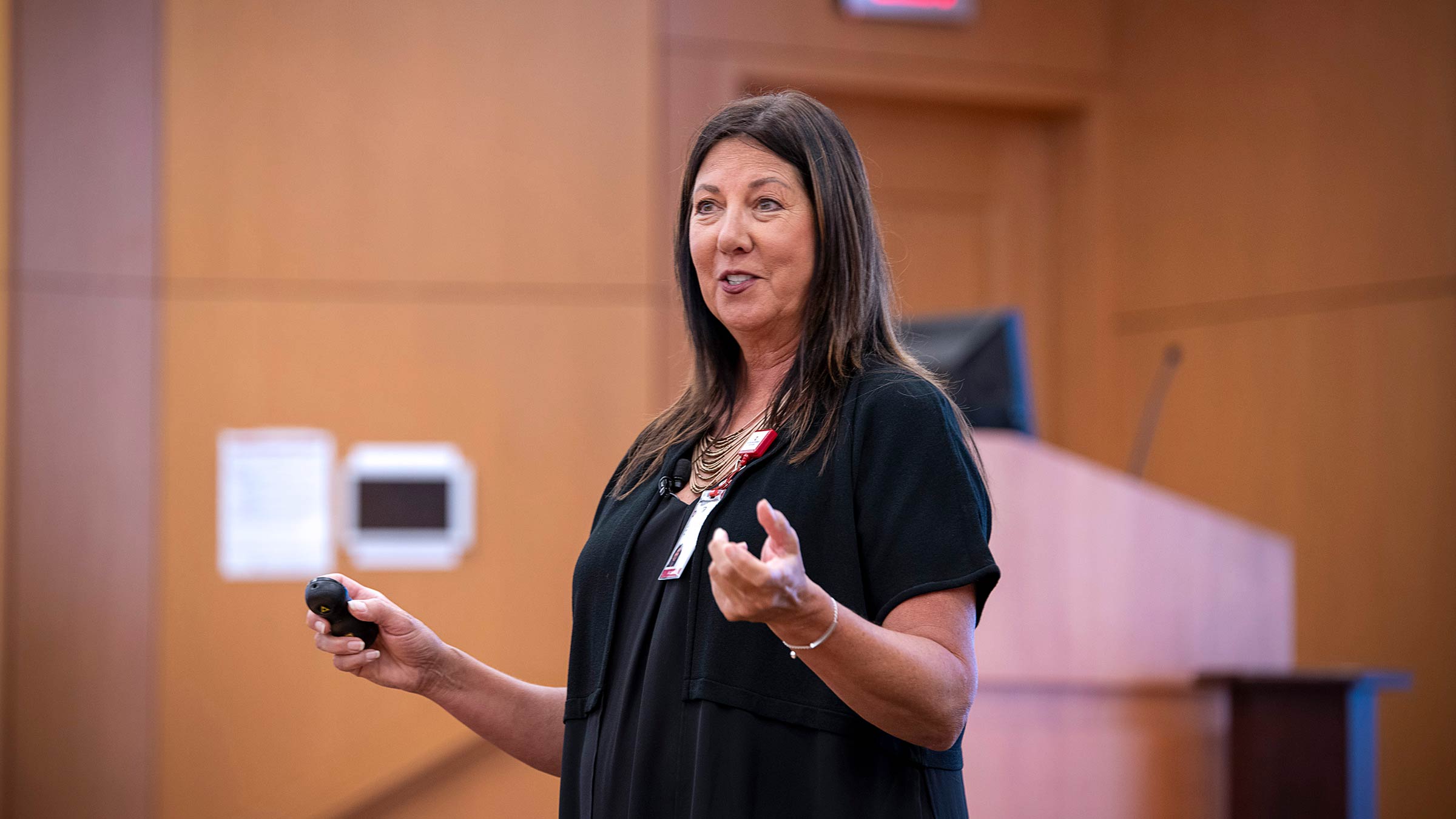
Silencing the self-critic
In a MINDSTRONG course, participants learn how their thoughts (negative or positive) affect how they feel, which in turn affects how they act.
The idea is if you’re feeling anxious or down, there’s likely a pessimistic thought tied to those feelings. Change that negative thought into a healthier, more optimistic one and you will start to feel better over time.
Here’s how it works: Say you’re in a classroom and assume everyone around you is smarter and knows more. As a result of that thought, you might feel reluctant to ask questions or contribute to discussions. So in class you stay quiet and passive. The MINDSTRONG course suggests: What if you changed the way you think by saying out loud to yourself every day, 10 times in the morning and 10 times in the evening: I am smart. I am worthy. I belong here.
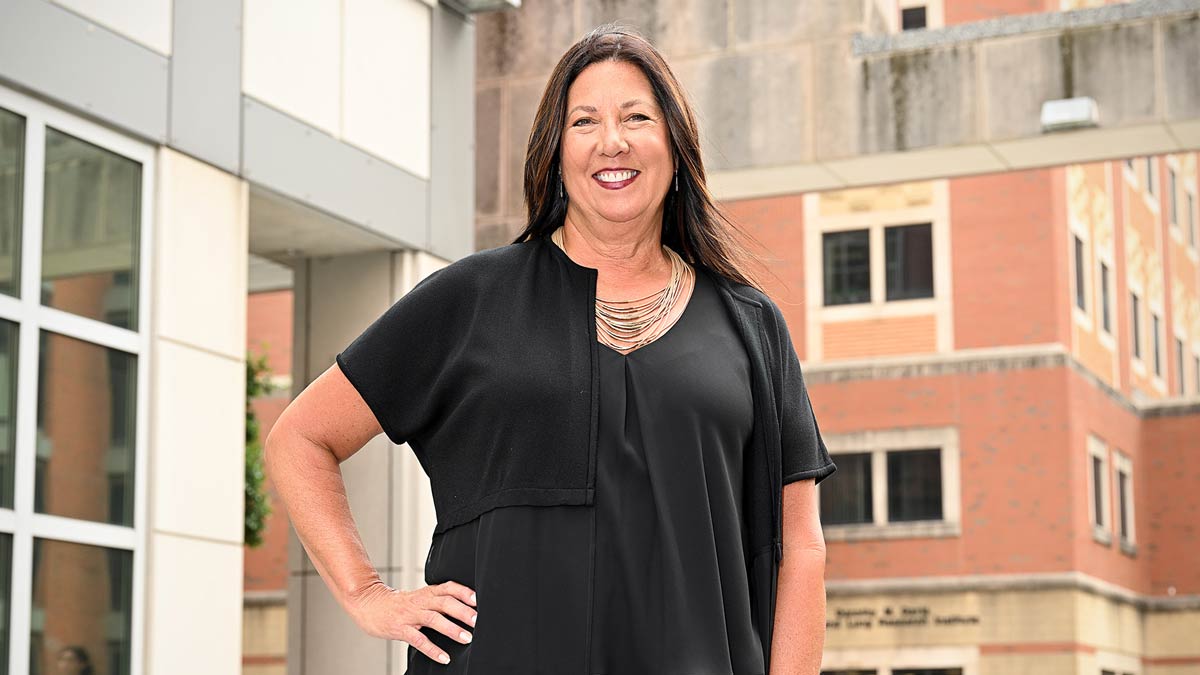
“As you say them to yourself over and over, they become your truth,” Dr. Hoying says.
“Even if it feels like a lie in the beginning, your brain doesn’t know the difference between a lie and the truth. It believes what you tell it. So, you’ll start to believe it, by just repeating it.”
By day four, your brain structure starts to change, showing the improved optimism, Dr. Hoying says. You feel more confident in class, more able to contribute, even though the material may be challenging.
“I can tell you all day long it’s evidence-based,” Dr. Hoying says of the techniques used in the teaching program. “But when you realize ‘I feel less stressed; this technique really helps me calm down,’ Then you believe in it.”
A chance meeting sets a career direction
One afternoon while in graduate school, Dr. Hoying sat in the lobby of Newton Hall on campus with her laptop open and her notes out when Dr. Melnyk approached her.
“It was completely random,” Dr. Hoying says. “She introduced herself and said, ‘What’s your dissertation interest?’ I told her, ‘I love health promotion. I love mental resilience.’”
The two immediately connected. MINDSTRONG came up in the conversation. Dr. Melnyk had used the program with high school students and with parents whose babies were born early with serious illnesses or disabilities. They talked about how it could be adapted to help college students and folks younger and older.
Dr. Hoying was thrilled about the prospect of getting involved.
“It was probably divine intervention,” she says of the chance meeting.
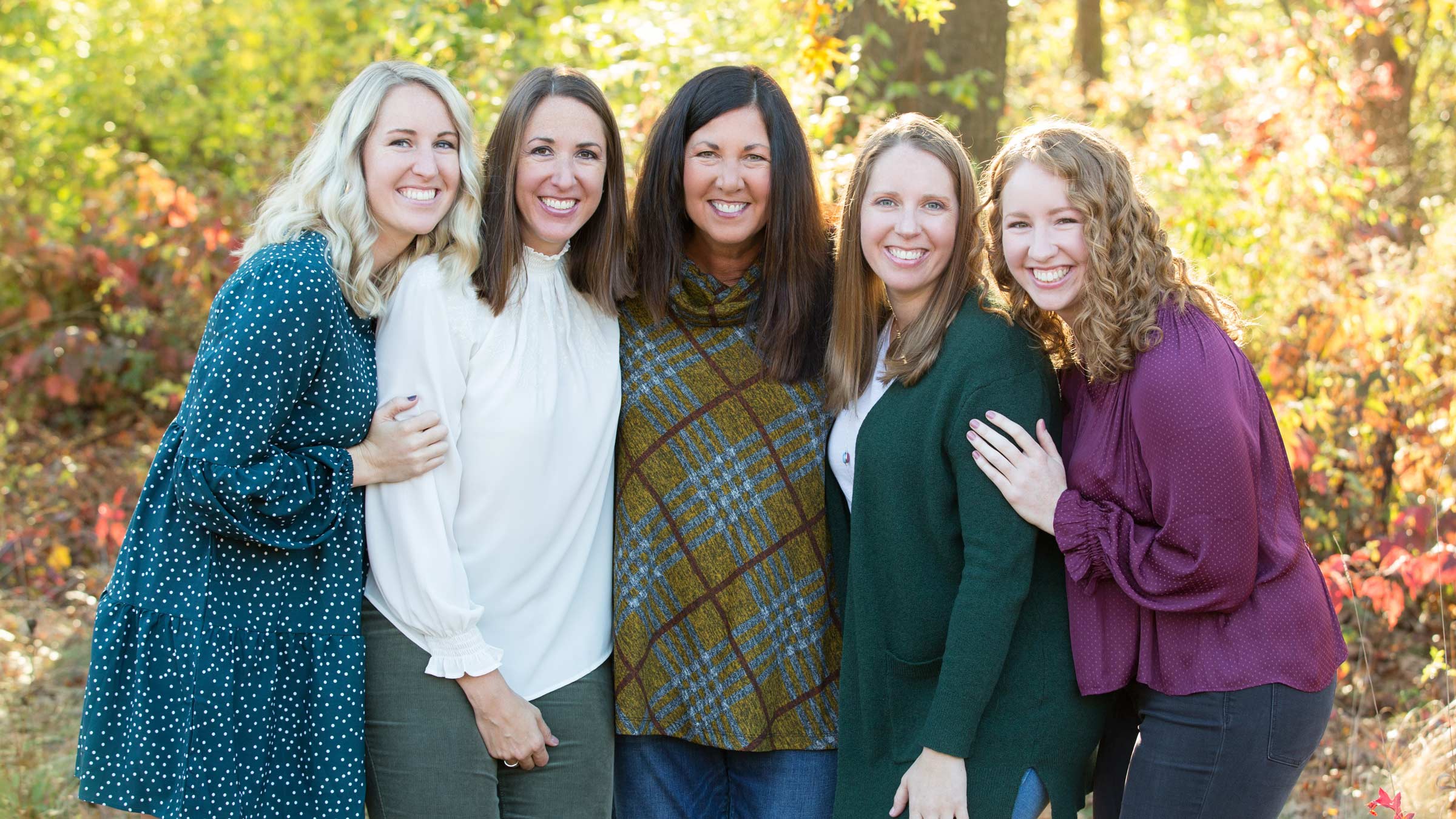
Teaching the skills to build resilience
A few weeks into the spring semester, Dr. Hoying begins class with a question for her students. Everyone in this class of Ohio State undergraduates are aspiring nurses and all but a few are women.
“What is one thing that went right today? Go ahead and put something in the chat.”
The cookies I made.
I woke up early enough to start on homework.
My husband volunteered to cook dinner tonight.
“Someone else is making dinner tonight?” Dr. Hoying says. “I love it.”
“As we think about what went right, we sometimes have to pause just a little bit longer than to think about what went wrong. Isn’t it interesting?”
She explains the natural tendency to focus on what didn’t go right, an adaptive trait going all the way back to cavemen who had to be alert to any potential dangers just to stay alive.
“For every positive thought you have, you have seven negative thoughts,” she says. “We’re working on flipping that ratio. Maybe you’re five to one by now. Maybe you’re four to one.”
Today’s class is about stress. Dr. Hoying defines it in a way her students may not have thought about: that stress is not only something you consider difficult but something you don’t think you can handle.
“All it takes is five breaths to move yourself away from fight or flight reaction to a more calm place,” she says.
How? With abdominal breathing.
“Usually when I mention abdominal deep breathing, someone rolls their eyes. ‘Come on Jackie. Are we really going to do this?’ ”
Dr. Hoying explains how. Her voice is soothing, well-suited to leading relaxation exercises.
She asks the class to try it on their own in the middle of the night if they can’t sleep, before an exam, before having a difficult procedure or conversation, or in the middle of an exam if a question stumps them.
“I would encourage you please to give it a whirl,” she says.
Then she closes the class referring to them not as students, but as friends: “Alright my friends, until next time.”
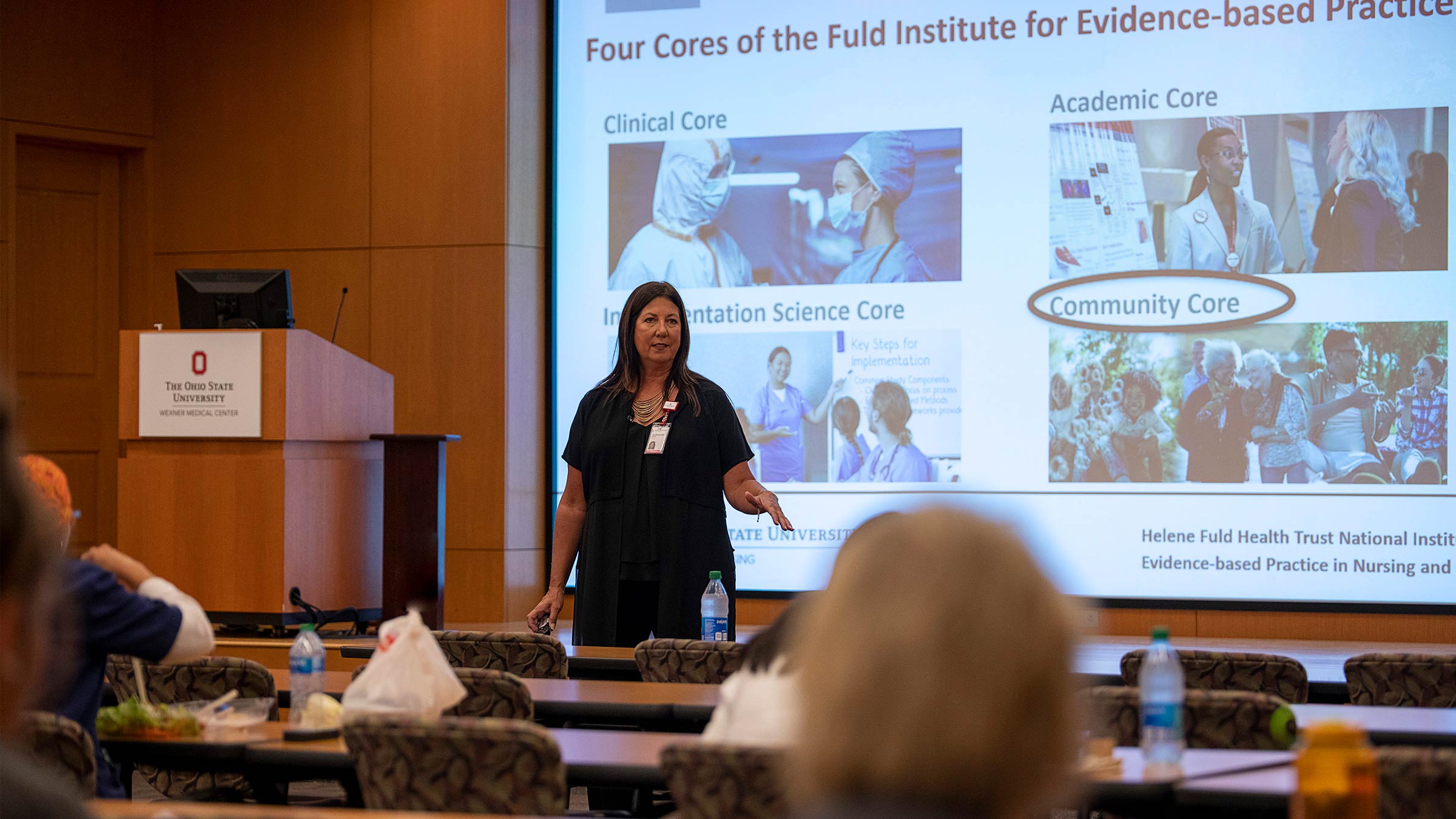
Applying the principals to her own life
Part of what inspires Dr. Hoying so much about MINDSTRONG is not only the research she and Dr. Melnyk have done showing it lowers rates of anxiety and depression, but also the fact that she’s seen it work for herself.
In her third year of a doctoral program in nursing, she was unsure she’d graduate. She was failing a statistics classes. For years, she believed she wasn’t good at math. Science, she felt confident in, but not math.
She talked to her advisor before retaking the class.
“I’ll never forget that meeting,” she says. “I sat across from her and she said: ‘If you don’t pass, you don’t go on.’”
So, Dr. Hoying did what she knew she had to: She redoubled her efforts not only in doing the work, but in convincing herself that she could succeed in the class. On sticky notes, she wrote affirming phrases: I’ve got this. I am good at math. I will succeed. She stuck them to her bathroom mirror, to her car dashboard, to the inside of her statistics book. Whatever message she kept telling herself, she would begin to believe.
At every office hour the professor held, she was there asking questions. Just before getting out of her car to go to classes, if she had time, she’d listen to the Kelly Clarkson song “Stronger” … What doesn’t kill you makes you stronger. Stand a little taller…
When the semester ended, she got the B she needed to pass the course and move on to the next statistics class.
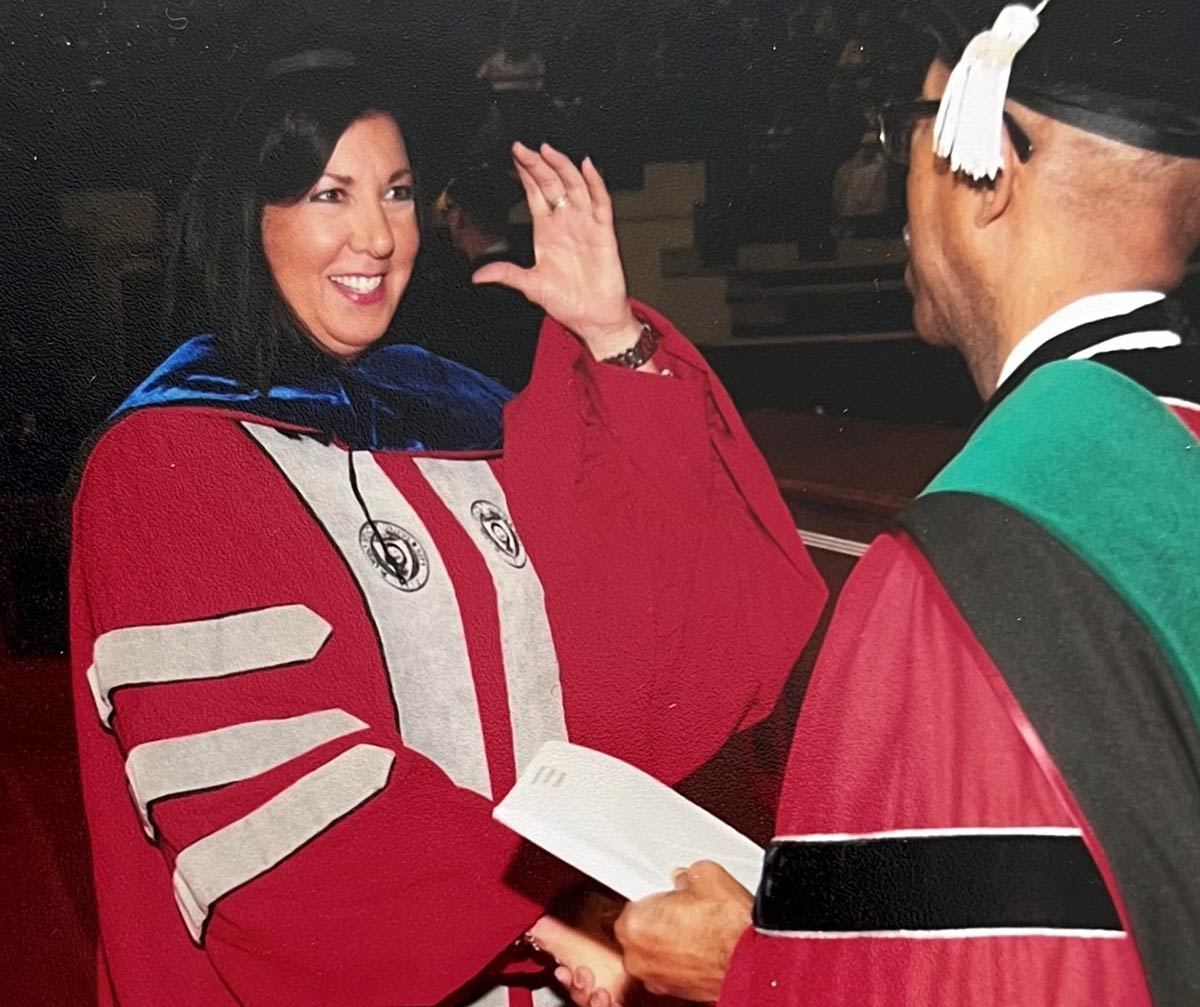
“I believed I could do it,” she says, explaining what had changed. “That was probably the turning point for me. That’s when I realized MINDSTRONG is really powerful stuff.”
Practicing what she teaches
As the director of MINDSTRONG, Dr. Hoying models the same self-awareness, patience and calm she teaches, says Sharon Tucker, PhD, RN, FAAN, a colleague of Dr. Hoying’s and professor in psychiatric-mental health nursing in Ohio State’s College of Nursing.
Though Dr. Hoying may have definite opinions on some matters, she listens first — truly listens — before offering her perspective, Dr. Tucker says.
“If you’re humble, as Jackie is, you value the input from multiple people and you’re willing to step back and say, ‘Yeah, I could be wrong about that.’ Or ‘I like your idea. Here’s another bent on that.’”
At times, Dr. Hoying’s humility hides her strong leadership skills, but they emerge as she mentors, coaches and influences others, Dr. Tucker says.
“It’s clear from the way she has advanced MINDSTRONG within and beyond Ohio State that she has that sense of how to run a business and how to run it well.”
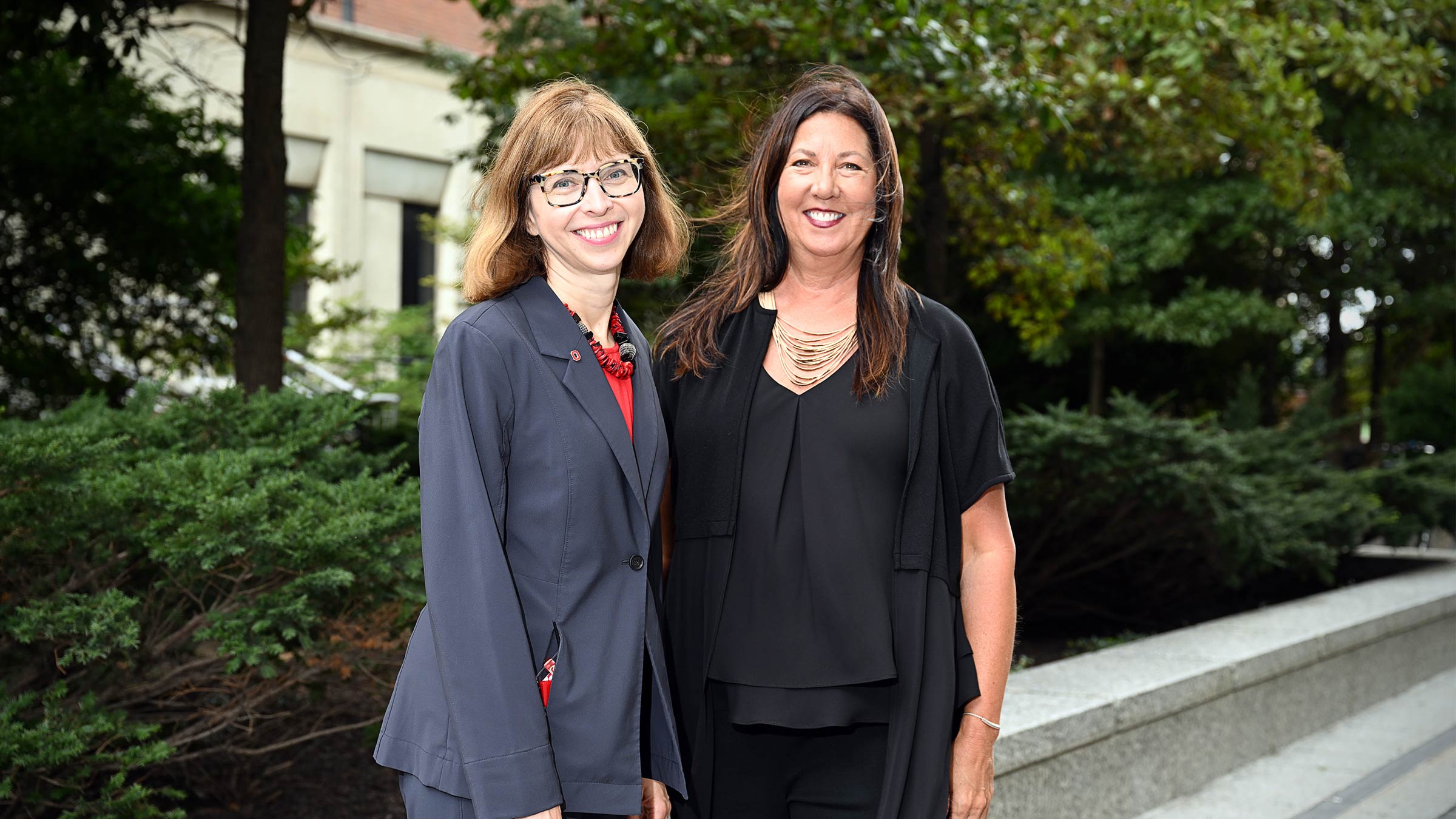
Guiding people to reputable health sources
Besides teaching college students, university and health care professionals about mental resilience, Dr. Hoying also leads the consumer wing of an Ohio State College of Nursing-run nonprofit. She is community core director for the Helene Fuld Health Trust National Institute for Evidence-based Practice in Nursing and Healthcare.
In that role, she helps direct the public to credible, legitimate sources of health care information online. She sees this as particularly important in today’s social media-fueled world where false claims abound about many pressing health issues, including COVID-19 and monkeypox and the cures and vaccines for each.
Through appearances in the media and at conferences, Dr. Hoying helps consumers decipher between fact-based health information and misinformation. She does it while respecting that people have different perspectives.
“We get really good at being clinical experts, going in and saying, ‘Let me tell you what you should do.’” That’s not the way to get people to see the true picture and make a decision. It’s better saying: ‘Here’s the evidence. But what do you want? What’s important to you?’”
Whether she’s advocating for accurate health information or training people on mindfulness, Dr. Hoying inspires trust and easily connects with people, says Barbara Jones Warren, PhD, APRN-CNS, FAAN, a professor of clinical nursing at Ohio State’s College of Nursing.
She’s quick to smile and can lighten a conversation with her humor.
“There’s a warmth about Jackie that you feel when you’re talking to her. It almost radiates from her,” she says. “I think Jackie just has an ability to make people feel comfortable and be able to interact with her. Not everybody has that.”
That knack may explain why she can so quickly establish rapport with people, online or in person, from baby boomers to the TikTok generation. And why she’s been able to expand so significantly the number of people trained in MINDSTRONG, extending ripples of positivity and possibility to everyone she teaches and those they, in turn, pass it onto.

We are transforming the future of health
Your support of the College of Nursing touches the lives of people everywhere and helps us prepare the next generations of health care leaders.
Give today



